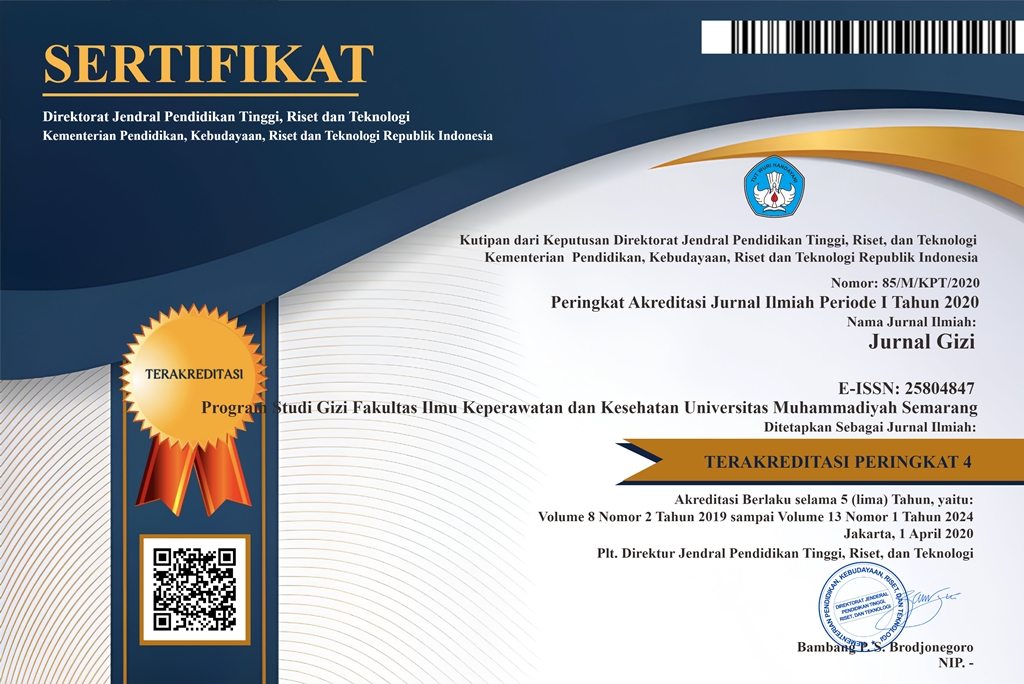Perbedaan Pemberian Air Susu Ibu Eksklusif dan Susu Formula Terhadap Kejadian Konstipasi Pada Bayi Usia 6 12 Bulan di Wilayah Kerja Puskesmas Kedungmundu Kota Semarang
(1)
(2)
(3)
(*) Corresponding Author
Abstract
The baby morbidity and mortality in Indonesian is still hight. Based on WHO (2010), about 13 million babies in the wold were death every years and a large part of them happened in
developing countries. Moreover, based on SDKI (Indonesia Demographic and Health Survey)2010 years, infant mortality rate in Indonesia is 34 per 1000 of life birth and child morbidity rate
is 411 per 1000 of child, and which 27.04% are baby and children. Once of the risk factors of the child morbidity is infant formula feeding so that it effects on exclusive breastfeeding. The result of Indonesian research shows that baby who has complementary feeding before 6 months old are more attacked on diarrhea, constipation, cough -cold, and fever than baby who only has exclusive breastfeeding.
This research is analytic research with cross sectional approach. The number of sample are 67 babies 6 12 months old who are lived at Sambiroto urban communities, is work area of
Kedungmundu Public Health Centers Semarang City. The sampling method is multistage random sampling. Chi-square test is used for statistical analysis to identify the difference
between exclusive breastfeeding and infant formula on constipation case.
The of constipation incident at the babies 6-12 months old who exclusive breastfeeding is zero (0 %) and at the babies 6-12 months old by the formula feeding is 28 babies (96,6 %).
There are a difference between exclusive breastfeeding and infant formula feeding, on constipation of babies 6 12 months old at work area of Kedungmundu Public Health Center (pvalue
= 0.00 < 0.05).
The incident rate of constipation at babies 6-12 months old is significantly lower than the babies who are given a infant formula feeding
Key Word: Exclusive Breastfeeding, Infant Formula feeding, Constipation
developing countries. Moreover, based on SDKI (Indonesia Demographic and Health Survey)2010 years, infant mortality rate in Indonesia is 34 per 1000 of life birth and child morbidity rate
is 411 per 1000 of child, and which 27.04% are baby and children. Once of the risk factors of the child morbidity is infant formula feeding so that it effects on exclusive breastfeeding. The result of Indonesian research shows that baby who has complementary feeding before 6 months old are more attacked on diarrhea, constipation, cough -cold, and fever than baby who only has exclusive breastfeeding.
This research is analytic research with cross sectional approach. The number of sample are 67 babies 6 12 months old who are lived at Sambiroto urban communities, is work area of
Kedungmundu Public Health Centers Semarang City. The sampling method is multistage random sampling. Chi-square test is used for statistical analysis to identify the difference
between exclusive breastfeeding and infant formula on constipation case.
The of constipation incident at the babies 6-12 months old who exclusive breastfeeding is zero (0 %) and at the babies 6-12 months old by the formula feeding is 28 babies (96,6 %).
There are a difference between exclusive breastfeeding and infant formula feeding, on constipation of babies 6 12 months old at work area of Kedungmundu Public Health Center (pvalue
= 0.00 < 0.05).
The incident rate of constipation at babies 6-12 months old is significantly lower than the babies who are given a infant formula feeding
Key Word: Exclusive Breastfeeding, Infant Formula feeding, Constipation
Full Text:
PDFArticle Metrics
Abstract view : 1274 timesPDF - 644 times
DOI: https://doi.org/10.26714/jg.5.1.2016.%25p
Refbacks
- There are currently no refbacks.
Diterbitkan oleh: Program Studi Gizi (D3 dan S1)
Fakultas Ilmu Keperawatan dan Kesehatan
Universitas Muhammadiyah Semarang
Sekretariat: Jl. Kedungmundu Raya No. 18 Semarang
Contact Person : Hapsari Sulistya Kusuma, S.Gz, M.Si (+62 85 6 41 536 553)

This work is licensed under a Creative Commons Attribution 4.0 International License.









.png)
.png)